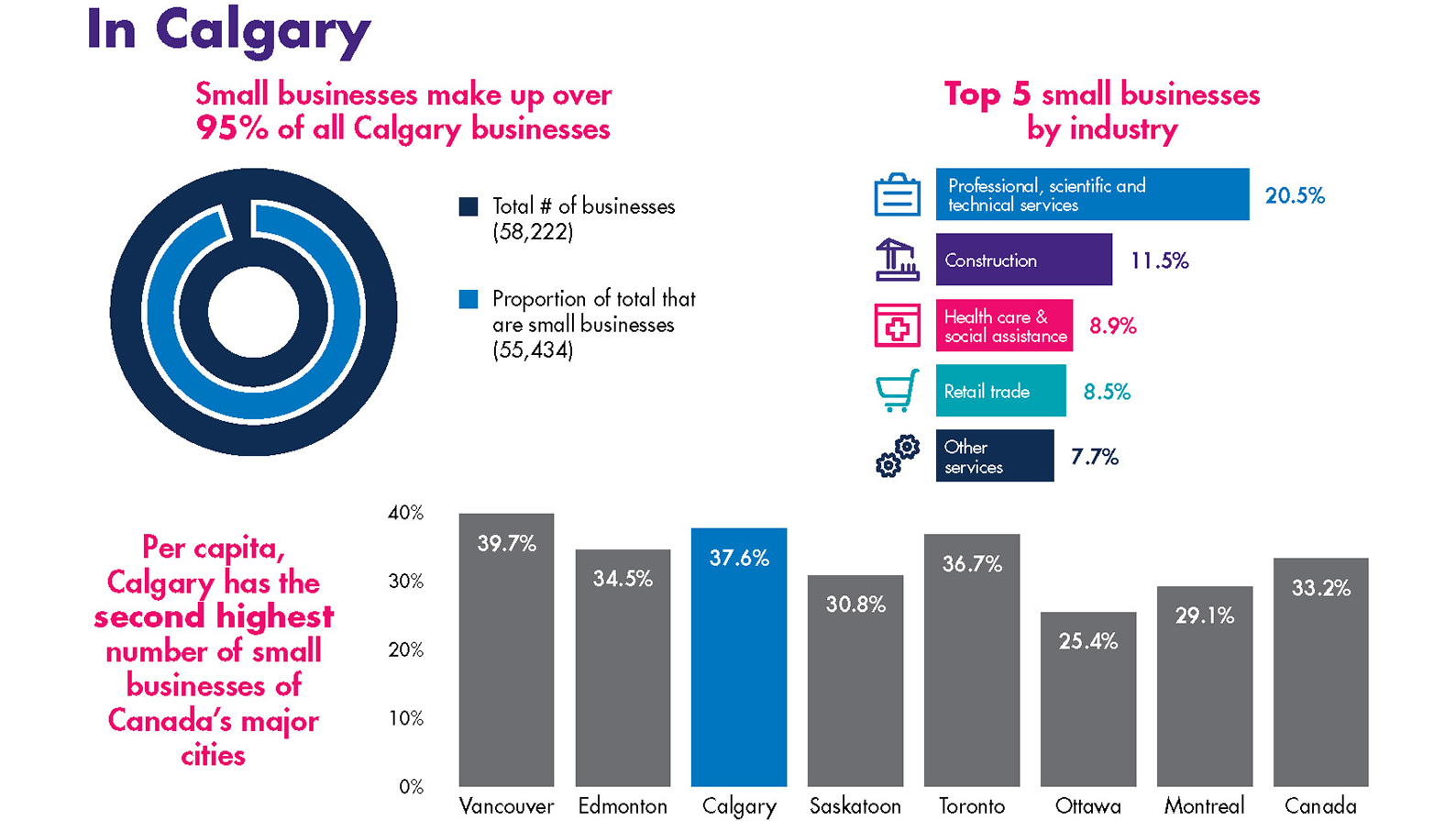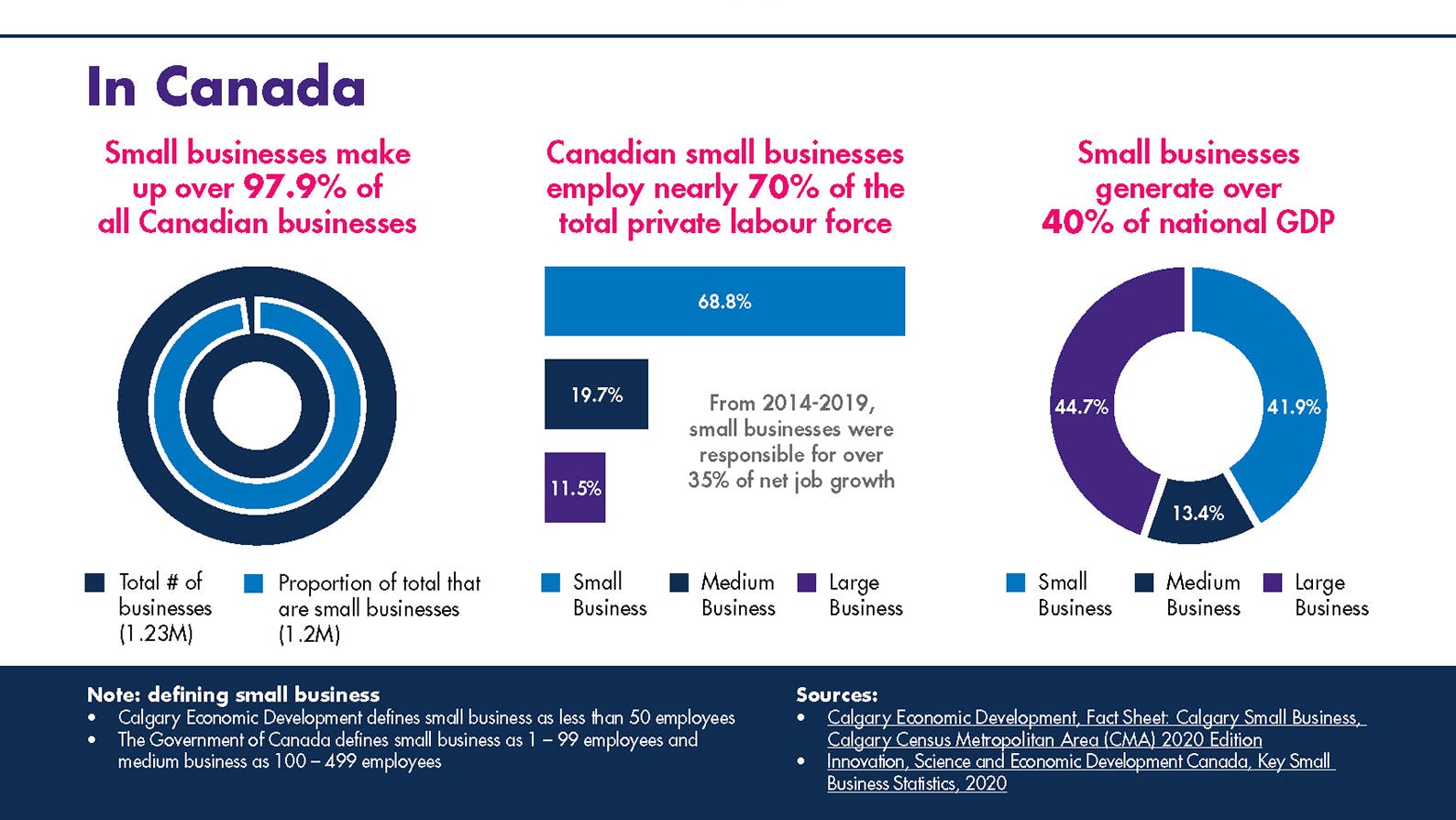Arianne Brady is Manager, Communications at the Calgary Chamber of Commerce. Her career to-date includes professional and volunteer roles with small business in tourism and hospitality, sales, property management and non-profit sectors.
I used to bother my mother about the old cider jug of loose change she kept on her nightstand. Every night, it was a ritual to shake the nickels and dimes from her pockets and purse. “What are you gonna buy?” I’d ask jokingly, thinking it would never amount to much. “Every penny adds up,” she’d invariably reply.
Then one year, ahead of the Christmas holidays, she sat my siblings and me down in our living room and presented us each with a plane ticket to the U.S.. None of us had ever flown. We’d barely made it out of the province. The trip itself would become a formative childhood memory – made possible by pocket change.
Small businesses are like that jar of loose change. Individually, their impact on our national economy is hard to notice. But when we step back and take the sum of those nickels and dimes, small businesses are the beating heart of our economy.
The big picture of small business
A healthy ecosystem: why (else) small businesses matter
As we work to nurture Canada’s economic ecosystem, we need to treat small businesses much like my mother treated her jar of change: she fed it regularly and knew its potential. As policy makers, governments, and fellow business community members, understanding how small businesses add up to be quite significant is imperative to our economic success.
Along with powering employment and economic activity, small businesses contribute many other intangibles that add to our quality of life and prosperity:
Innovation
Innovation often starts small. Apple Computers started out of Steve Jobs’ garage as a small business. As the home of the Caesar and birthplace of ginger beef, Calgary, is no stranger to innovation. New products, technology and services are often powered by small businesses. Benevity came on the scene in 2008 as a Calgary small business software startup with a focus on reinventing corporate giving. Today, having graduated from the small business category, about 35% of Fortune 500 companies have adopted its software including Nike, Coca-Cola, Google and Apple.
Talent and skills
As I’ve come to learn, my personal story of coming to Calgary mirrors the experiences of many. I was drawn to Calgary by the quality and variety of post-secondary options and affordable living. I made my way through university, working part time with Calgary Co-op. After graduating, I decided to stay based on the variety of opportunities here. I’ve since built a career working for small businesses in a variety of industries from hotels and hospitality to non-profits. While this is just my story, it speaks to the idea that a healthy small business ecosystem can attract and retain the talent and skills needed to power our economy.
Community vibrancy
The experience of a city is often made memorable by newly discovered small businesses: a favourite hole-in-the-wall breakfast joint, a local spin studio, that perfect locally roasted cup of joe. Cities are often known by their vibrant neighbourhoods: Byward Market, Granville Island, Kensington. And most often what brings energy to those places is, you guessed it, small businesses. In this way, small businesses do big things to make our neighbourhoods and communities attractive for people to live, work and play.
Diversification
While the impact of Calgary’s energy economy is no secret, the ups and downs of our energy sector have actually been a powerful source to jump-start diversification. The impacts of climate change combined with the challenges of global energy prices have spurred innovations that are helping Calgary grow as the heart of Alberta’s energy sector AND a hub for emerging sectors like green technology, life sciences and financial services. Furthermore, Calgary’s boom times have allowed small businesses in sectors like the arts, construction, retail and tourism industry to grow and mature.
Agility and flexibility
When it comes to the ability to pivot, small is mighty. Small business’s agility is driven by fewer layers of bureaucracy, decision makers often working the cash register, and a spirit of “get ‘er done,” enabling them to be more nimble than most large corporations. There is no stronger case for this than the COVID-19 pandemic. Small businesses, in particular, have had to figure things out quickly. Whether accessing government supports, adapting to unpredictable restrictions, or coming up with new ways to do business, small businesses have shown dexterity when it comes to rolling with the punches to survive.
The time is now: celebrating and supporting small businesses
According to a Chamber survey released earlier this year, approximately 70 per cent of businesses accessed at least one form of government support during the pandemic. For many small businesses, the past 18 months have been the ultimate test of survival. Now, as economies and sectors reopen, they need our support.
3 ways you can support small business
1. Shop and support local
This one is obvious. Less obvious is the fact that not all sectors will recover and reopen at the same pace. Performing arts need lead time to prepare for an upcoming season. Some industries, such as construction and manufacturing, are still struggling with lagging supply chains. Others, particularly in the hospitality and service sector, are working hard to hire and train new talent.
Small businesses need our patience and our patronage to move out of survival mode. In the meantime, Calgarians can help businesses recover faster by continuing to shop and support local.
2. Join the election conversations
Upcoming elections mean Calgarians and Canadians have an opportunity to support policy that clears a path for small businesses to start, grow, compete and thrive.
- Municipally, the Chamber has developed and shared Pathways to Potential, a platform focused on ensuring our next City Council prioritizes revitalizing our downtown, attracting, retaining and investing in talent, rebalancing and stabilizing property taxes, creating an inclusive city, reducing barriers doing business and cultivating business-to-consumer connections.
- From Challenge to Change is the Chamber’s federal platform, which includes recommendations on economic recovery and diversification, along with next steps to address challenges with taxation and the federal system of fiscal transfers. It also examines how to reduce barriers to trade and improve market access for Canadian-made goods and services. Small businesses have a stake in all these policies and are a key focus of the Chamber’s recommendations.
- Get involved in the conversation by checking out the Chamber’s election platforms, tuning into Chamber events and social media, and getting out to vote in our federal election on September 20th and municipal election, October 18th!
3. Tune into Small Business Week
October 18 – 22 is Small Business Week, an opportunity to celebrate the value small businesses bring to our local and national economies.
The week concludes with the Chamber’s annual Small Business Awards on October 22, recognizing and celebrating the small businesses that have inspired change and created opportunity in our city.
Come out to the Small Business Week Expo on October 21, consider nominating a small business for next year’s awards, or attend a workshop event during the week-long celebration of Calgary’s small businesses.
The math of pennies and pounds
Another anecdote from my mother: “Don’t be penny wise and pound foolish”. Similarly, we shouldn’t forget the value and impact small businesses have to our economy, and what many pennies can amount to. Small businesses are the lifeblood of our cities, driving innovation, employment and job creation, and helping our economy grow and thrive.
Supporting small businesses is much like putting nickels and dimes into a jar of change: keep investing and remain focused on the potential and great things will come. In my case, it was a plane ticket. In the case of Canada’s economy: recovery and long-term prosperity.







